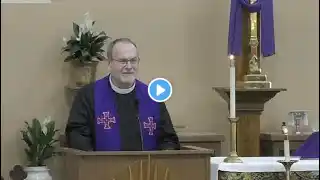
CTK Second Sunday in Lent - Year C "Jesus laments over Jerusalem"
Our Collect today reminds us: “that we have no power in ourselves to help ourselves” and our dependency is on God keeping us from anything bad, “that may happen to the body, and from all evil thoughts that may assault and hurt the soul.” During this season of Lent, we ponder the darkness in the world and the contrasting brightness of Jesus, who gives light to our paths in life. In today’s gospel reading, Jesus uses the image of a narrow door to be entered in and a master deciding who to let in. In other places in the scripture, this same image might be referred to as a narrow path, a place, or gate. We have to enter through this narrow way. I want to focus on three main points today: • Jesus IS the narrow way. He IS God’s door of grace. • If we ignore or reject the right way, we do become lost. • Jesus invites all; our response to Jesus matters. I want to start with a story about an Atlantic Pollock fish who was swimming south, out in the Gulf Stream, which as you might know, actually flows north along the eastern coast of the U.S. On his journey, somewhere off the coast of St. Augustine, he was swimming hard against the current and a couple of Acadian Redfish were heading the other way to the north, side-by-side, casually swimming with the current. As they passed each other, the Pollock commented to the Redfish, “Wow, this current is really strong today.” The Redfish nodded and kept swimming easily to the north. After awhile, one of them turned to the other, and said “What’s a current?” Every culture, every society, every group of people have their own “current” which is “the way things are done” and what is acceptable. A culture’s current is not necessarily a bad thing, in fact, the culture and mores of a society are part of what defines and sustains it. If you are part of that culture, life seems fairly smooth and easy, just like the fish swimming with the current. The problem is that secular cultures, by their very nature, are based on worldly values and can offend, restrict, or even ban religious freedoms. On the other hand, cultures can be driven by religious-dogma based on legalism, conformity, and forced obedience. Our most blatant example is the Taliban in Afghanistan, forbidding women from going out in public alone, working outside the home, driving, and girls are not even allowed to play sports or attend school. Jesus was constantly moving against the popular currents in his day as he taught about the Kingdom of God. 1) The everyday Jewish people wanted a military Messiah to attack and throw off the burden of Roman oppression, but Jesus preached about loving enemies and praying for those who persecute you. 2) The religious leaders wanted to create a pure society based on the Laws of Moses, yet Jesus healed, feed, and taught about his kingdom to everyone, regardless of where they came from. 3) The Cultic practices spreading rampant immorality and false gods assaulted all sacredness. However, it was Jesus’ miracles and healings that showed them the ‘one true God’ who is holy and pure and true and full of grace. Jesus calls us to lives of holiness. In John 10:9-10, Jesus said “I am the door. If anyone enters by me, he or she will be saved and will go in and out and find [good] pasture. The thief comes only to steal and kill and destroy. I came that they may have life and have it abundantly.” The Kingdom of God is where forgiveness is given, hope is found, healing occurs, belonging awaits, truth is shared, and where redemption is offered. The narrow way brings us into the Kingdom of God, the one Jesus told us about. So here are the three main points I hope you’ll remember: Jesus IS the narrow way. He IS God’s door of grace. – vs. 24 “Strive to enter through the narrow door. For many, … will seek to enter and will not be able.” There is no other door into a relationship with God than Jesus. He is “the way, and the truth, and the life” and there is no other pathway that leads to God. Jesus is the link between heaven and earth; he’s the one who came from the Father, became a person, lived, died, rose again from the dead, and ascended back to the Father. Jesus is the visible expression of the invisible God. Back in 1976, Campus Crusade for Christ launched the “I Found It” campaign. “I Found It” was seen virtually everywhere on bumper stickers, t-shirts, and billboards. The plan was for non-Christians to ask “What did you find?” and you would answer “I found Jesus” which would start a conversation. One day, when my older brother was at work, a man he worked with in his 70s asked my brother what it meant. When my brother said, “I found Jesus.” This older man paused, and said, “You found Jesus? He weren’t the one who was lost.” Jesus IS the narrow way. He IS God’s door of grace.